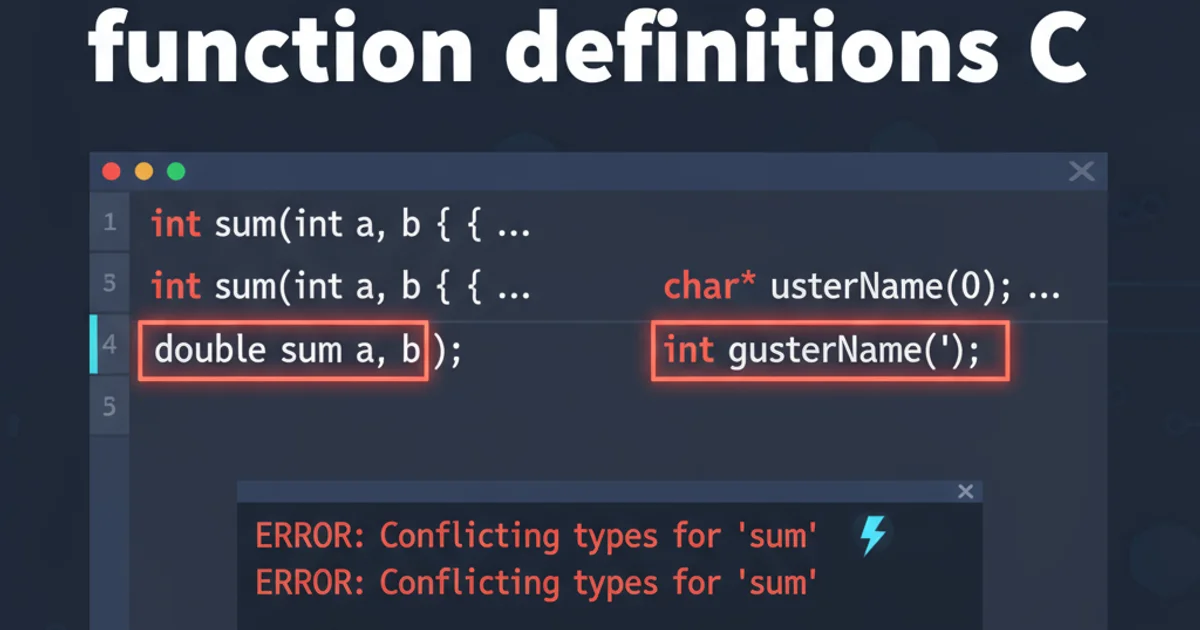Conflicting types with function definitions C
Categories:
Resolving Conflicting Types in C Function Definitions

Understand and fix common 'conflicting types' errors in C, particularly when working with function declarations and definitions across multiple files in Linux environments using GCC.
The 'conflicting types' error in C is a common pitfall for developers, especially when dealing with function declarations and definitions spread across multiple source files. This error typically arises when the compiler encounters a function's declaration (prototype) that doesn't match its subsequent definition, or when multiple declarations for the same function within different compilation units are inconsistent. This article will delve into the root causes of this error, demonstrate how it manifests, and provide practical solutions to resolve it, focusing on a Linux environment with the GCC compiler.
Understanding the 'Conflicting Types' Error
In C, every function must be declared before it is used. A function declaration (or prototype) tells the compiler about the function's return type, name, and the types and order of its parameters. The function definition, on the other hand, provides the actual implementation of the function. The 'conflicting types' error occurs when the compiler finds an inconsistency between these two. This can happen due to several reasons:
- Mismatched Return Types: The return type in the declaration differs from the return type in the definition.
- Mismatched Parameter Types/Order: The number, type, or order of parameters in the declaration does not match the definition.
- Missing Declaration: A function is defined without a prior declaration, and the compiler implicitly declares it based on its first usage, which might conflict with its actual definition later.
- Inconsistent Declarations: Multiple declarations for the same function exist, and they are not identical.
- Header File Issues: The most common cause is incorrect or missing header file inclusions, leading to different compilation units seeing different declarations for the same function.
flowchart TD
A[Function Declaration] --> B{Compiler Sees Declaration};
B --> C[Function Definition];
C --> D{Compiler Compares Declaration and Definition};
D -- Mismatch --> E["Error: Conflicting Types"];
D -- Match --> F[Compilation Continues];
E -- Fix Inconsistency --> A;Flowchart illustrating how 'conflicting types' errors occur during compilation.
Common Scenarios and Solutions
Let's explore some common scenarios where this error occurs and how to fix them. We'll use a simple example involving two C files and a header.
// mylib.h
#ifndef MYLIB_H
#define MYLIB_H
// Incorrect declaration: missing parameter type
int add(int a, b);
#endif
// mylib.c
#include "mylib.h"
// Correct definition
int add(int a, int b) {
return a + b;
}
// main.c
#include <stdio.h>
#include "mylib.h"
int main() {
int result = add(5, 3);
printf("Result: %d\n", result);
return 0;
}
When compiling these files with GCC:
gcc main.c mylib.c -o program
You would likely encounter an error similar to:
mylib.c:5:5: error: conflicting types for 'add'
mylib.h:5:5: note: previous declaration of 'add' was here
The error message clearly points to mylib.h and mylib.c, indicating an inconsistency in the add function's type. In mylib.h, the declaration int add(int a, b); is problematic because b is not explicitly typed, leading the compiler to assume int b in the definition, but potentially int b in the declaration if it's an old C standard or int by default. The safest and correct way is to explicitly type all parameters.
Correcting the Conflict
To resolve the conflict, we need to ensure that the function declaration in mylib.h exactly matches the function definition in mylib.c.
// mylib.h (Corrected)
#ifndef MYLIB_H
#define MYLIB_H
// Correct declaration: all parameter types specified
int add(int a, int b);
#endif
With this correction, the mylib.h header now provides a consistent prototype for the add function. When mylib.c and main.c include this header, both compilation units will see the same, correct declaration, resolving the 'conflicting types' error.
void parameters. int func(); in C means func takes an unspecified number of arguments, while int func(void); explicitly means func takes no arguments. Mismatching these can also lead to conflicting types.Best Practices to Avoid Conflicts
Adhering to a few best practices can significantly reduce the occurrence of 'conflicting types' errors:
- Use Header Files Consistently: Always declare functions in a header file (
.h) and include that header file in both the source file (.c) where the function is defined and any source files where it is used. This ensures a single, consistent declaration. - Match Declarations and Definitions Exactly: Pay close attention to return types, function names, and the types and order of parameters. Even a slight difference will cause a conflict.
- Use
externfor Global Variables: If you declare global variables in a header, use theexternkeyword to indicate that they are defined elsewhere, preventing multiple definitions. - Include Guards: Always use include guards (
#ifndef,#define,#endif) in your header files to prevent multiple inclusions, which can sometimes indirectly lead to type conflicts. - Compiler Warnings: Pay attention to compiler warnings. GCC, for instance, often provides helpful warnings about implicit declarations or potential type mismatches even before they become hard errors.
graph TD
A[Source File 1 (.c)] --> B{Includes Header.h};
C[Source File 2 (.c)] --> B;
B --> D[Function Declaration in Header];
E[Function Definition in Source File 1] --> D;
D -- Consistent --> F[Successful Compilation];
D -- Inconsistent --> G["Conflicting Types Error"];Diagram showing the role of header files in maintaining consistent function declarations.